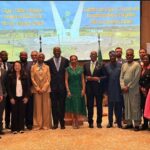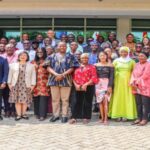Nigeria Protests US Visa Restriction, Demands Reconsideration in Spirit of Partnership
By Raymond Enoch
The Federal Government of Nigeria has formally reacted to a recent decision by the United States Government to drastically reduce the validity period and entry allowance for certain categories of non-immigrant visas issued to Nigerian citizens.
According to a statement made available to the press and signed by the Chief Spokesperson of the Ministry of Foreign Affairs, Kimiebi Imomotimi Ebienfa, the Nigerian government expressed deep concern over the new visa policy, describing it as subject of ” Concern” given the longstanding bilateral ties between the two countries.
The new U.S. directive, which affects the B1/B2 (business and tourism), F (student), and J (exchange visitor) visa categories, slashes visa validity from the previous multiple-entry durations of up to two years to a single-entry visa valid for just three months.
“The Federal Government views this development with concern and keen interest,” the statement read. “Particularly given the longstanding cordial relations and strong people-to-people ties between our two countries. The decision appears misaligned with the principles of reciprocity, equity, and mutual respect that should guide bilateral engagements between friendly nations.”
The Ministry noted that the policy shift imposes a disproportionate burden on a wide spectrum of Nigerian citizens, including students pursuing academic opportunities in the U.S., professionals engaging in business and investment efforts, cultural ambassadors, and families seeking to maintain cross-border bonds.
While acknowledging the United States’ sovereign right to determine its immigration policies, the Nigerian Government emphasized the need for fairness and mutual respect in such decisions.
“Diplomatic engagements are ongoing,” Ebienfa affirmed, adding that Nigeria remains committed to resolving the matter through diplomatic channels. “The Ministry of Foreign Affairs remains committed to pursuing a resolution that reflects fairness and upholds the values of mutual interest.”
The Ministry’s statement is being interpreted as a calibrated diplomatic response — firm, yet measured — aimed at preserving the broader strategic partnership between Abuja and Washington while asserting Nigeria’s interest on the global stage.
The U.S. Embassy in Abuja had earlier updated its visa reciprocity schedule, citing a reassessment of security, policy, and administrative frameworks. While no public explanation has been offered for the abrupt change, analysts suggest it may be tied to broader global security trends or perceived concerns about overstays and visa misuse — claims Nigerian authorities have previously pushed back on with data-based rebuttals.
Students, in particular, may bear the brunt of this policy shift. Many Nigerian students in the U.S. have historically relied on extended visa validity to travel for holidays, internships, or conferences without the financial and logistical burden of frequent visa reapplications.
“This is a step backward,” said an education consultant in Lagos, reacting to the announcement. “It undermines access, equity, and the trust that has been carefully built between both nations.”
In diplomatic circles, Nigeria’s measured but strong-worded response signals its unwillingness to accept what it perceives as unequal treatment. The Ministry’s reference to “reciprocity” suggests that Nigeria may be reviewing its own visa regime for U.S. citizens, though officials declined to comment on whether retaliatory action is on the table.
As global travel and academic mobility regain momentum post-pandemic, Nigeria’s position is clear: visa policy should not become a tool of asymmetrical diplomacy. In the words of the Ministry’s spokesperson, “We urge the United States to reconsider this decision in the spirit of partnership, cooperation, and shared global responsibilities.”










